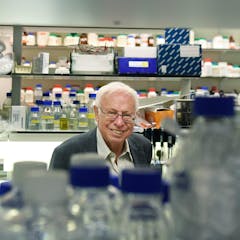
Articles on BRCA1
Displaying 1 - 20 of 24 articles

Family history may be the most important thing to take into account when it comes to breast cancer risk.

Scientists explain why commercial gene testing should be used with caution.

Individuals who carry the breast cancer genes BRCA1 or BRCA2 are often unaware of the fact. That suggests that physicians need a new way to apply DNA-based screens to identify those at risk.

Mutations in BRCA genes are linked to the early onset of breast and ovarian cancers. But the effect of most mutations is unclear. Now new research can distinguish harmless from dangerous mutations.

We now have the capacity to quickly and cheaply sequence an individual’s genome and scour it for disease-causing genes. But how much, and what type, of information does a parent-to-be want to know?

More people are sending off saliva samples to find out about their genetic roots. But the raw DNA results go way beyond genealogical data – and could deliver unintended consequences.

A genetics testing company recently won approval from the FDA to market a test that can identify a breast cancer gene mutation. But what are women supposed to do with that information? There’s risk involved.

The recipients of this year’s Nobel Prize for Chemistry showed that DNA is far from static. Rather, it is bombarded by damaging forces, but our bodies know how to repair these precious strands.

Australia’s highest court has ruled a gene mutation linked to cancer cannot be patented, ending a long battle over whether companies can own the rights to genetic material.

What if you could take a simple test to reveal your individual risk of developing a range of cancers and hundreds of other diseases?

The High Court challenge is the last resort for Ms D'Arcy’s test case against companies patenting human genes and has implications for patients, clinicians and researchers.

The Federal Court’s decision that gene patenting is permitted in Australia will have ramifications for all gene patents, even though the case involved only one gene associated with breast cancer. A gene…

A Federal Court decision to allow gene patents could open the way for existing patents to be enforced more strongly in Australia, according to an expert in intellectual property. Biotechnology companies…

Angelina Jolie made the decision to have a double mastectomy after discovering she carried a faulty copy of the hereditary gene BRCA1 and was told she had an 87% chance of developing breast cancer. Jolie…
Women with the BRCA1 mutation should have their ovaries removed before the age of 35 to reduce their risk of ovarian and…

Use of the anti-cancer drug Tamoxifen is associated with a dramatically reduced risk of developing a second breast tumour among women with a high risk gene mutation who have experienced breast cancer already…

All nine members of the US Supreme Court have ruled that isolated genetic material cannot be patented – unless the material is markedly different to what exists in nature. The court ruled against Myriad…

Following Hollywood actress Angelina Jolie’s revelation last week that she’d undergone a double mastectomy to prevent breast cancer, it has emerged that a 53-year-old man had his prostate removed after…

Angelina Jolie’s recent announcement about her double mastectomy likely caused many women to think about their own chance of developing breast cancer. But before you rush off to have a bunch of possibly…

Angelina Jolie has attracted much attention for revealing her recent experience of a double mastectomy. But her personal attractiveness draws attention to a neglected aspect of cancer treatment and survival…
